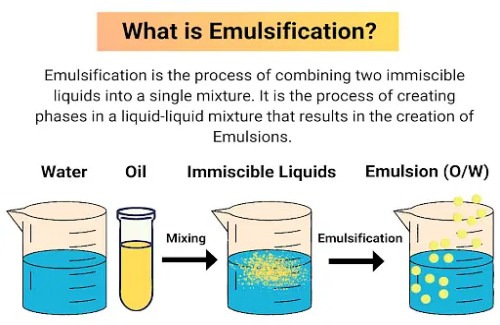The Chemistry Behind Emulsifiers and How They Work
The Scientific research Behind Emulsifiers and Their Relevance in Modern Production
Emulsifiers play a crucial role in modern-day production, functioning as the unrecognized heroes that mix oil and water for a large range of products. You might not realize just how these compounds boost texture and stability, yet their influence is significant across sectors. As customer preferences change in the direction of cleaner labels, the need for ingenious emulsifiers is growing. What does this mean for the future of product formulation? Let's discover additionally.
What Are Emulsifiers?
Emulsifiers are crucial agents on the planet of food and item manufacturing, functioning as the adhesive that binds 2 otherwise immiscible fluids, like oil and water. You might not realize it, however these substances play a vital duty in developing stable blends. They reduce the surface stress between these liquids, allowing them to blend flawlessly. Typical instances consist of lecithin discovered in egg yolks and soybeans, and mono- and diglycerides made use of in various refined foods.

When you whip up a salad dressing or delight in a luscious treat, emulsifiers aid keep that perfect texture. Without emulsifiers, several foods would divide, leading to undesirable appearances and flavors.
The Chemistry of Emulsification
When you blend oil and water, you might discover they do not blend conveniently; that's where the chemistry of emulsification comes right into play. Emulsification occurs when little droplets of one fluid disperse in an additional, developing a secure combination. This happens due to the fact that oil and water are immiscible because of their varying polarities-- water is polar while oil is non-polar. To overcome this challenge, emulsifiers are used.
These molecules have a hydrophilic (water-attracting) head and a hydrophobic (water-repelling) tail. When you add an emulsifier, its particles position themselves at the oil-water user interface, decreasing surface area stress and enabling the beads to blend. The emulsifier develops a protective layer around each droplet, stopping them from integrating back into separate layers. Comprehending this chemistry is vital for attaining stability in items like dressings, creams, and sauces, making emulsification crucial in modern production.
Kinds Of Emulsifiers
Various sorts of emulsifiers play vital duties in stabilizing blends of oil and water. You'll frequently experience 2 primary categories: natural and synthetic emulsifiers. Natural emulsifiers, like lecithin from egg yolks or soy, are stemmed from plants and animals, making them preferred in food items. They're generally taken into consideration more secure and healthier alternatives.
On the other hand, synthetic emulsifiers, such as mono- and diglycerides, are chemically crafted to boost security and service life. They're frequently utilized in processed foods and cosmetic items.
Furthermore, you may come throughout non-ionic, anionic, and cationic emulsifiers, each with special properties that affect their efficiency. Non-ionic emulsifiers, for instance, work well in a variety of pH levels, while anionic emulsifiers often tend to perform better in alkaline problems. Recognizing these types can aid you choose the best emulsifier for your certain application.
Devices of Solution Formation
Comprehending just how solutions create is vital for producing stable mixtures of oil and water. Emulsions occur when you spread little droplets of one liquid into an additional immiscible liquid, such as oil in water. This procedure requires power, commonly provided through frustration or blending. When you introduce an emulsifier, it reduces the surface area stress in between both fluids, permitting them to mix more quickly.
The emulsifier molecules have a hydrophilic (water-attracting) head and a hydrophobic (oil-attracting) tail. When you add an emulsifier, these molecules arrange themselves at the oil-water user interface. The hydrophilic heads engage with water, while the hydrophobic tails anchor right into the oil. This creates a barrier that maintains the beads, preventing them from coalescing.
Applications of Emulsifiers in Different Industries
Emulsifiers play an essential function across numerous industries, making your favorite foods smoother and a lot more pleasurable. In cosmetics, they improve product appearance and stability, making sure an enjoyable application experience. Plus, in pharmaceuticals, they aid supply crucial components effectively, boosting total efficacy.
Food Sector Utilizes
While you may not understand it, emulsifiers play an essential function in the food sector, improving the structure, security, and shelf life of many items. In baked products, emulsifiers boost dough handling and preserve dampness, resulting in a better structure and extended freshness. By guaranteeing uniformity and top quality, emulsifiers are considerable to providing the scrumptious items you delight in every day, making them an important component in contemporary food manufacturing.
Aesthetic Solutions Advantages
When it comes to aesthetic formulas, emulsifiers are crucial for creating items that really feel elegant and do efficiently. You'll see that emulsifiers enhance product security, stopping separation and prolonging rack life. On the whole, emulsifiers play a crucial function in providing top notch cosmetic products that satisfy your elegance requirements.
Pharmaceutical Applications Review
In the pharmaceutical industry, emulsifiers are essential for formulating reliable medicines. They aid produce secure mixes of oil and water, making certain that active ingredients are uniformly dispersed and quickly absorbed by the body. You'll locate emulsifiers in numerous dosage types, like lotions, lotions, and liquid suspensions, boosting the bioavailability of drugs. They also improve the appearance and security of items, making them extra appealing and much easier to make use of.
The Influence of Emulsifiers on Item Quality

By ensuring stable emulsions, you lower the risk of perishing and expand service life, ultimately saving you time and cash. You'll also locate that emulsifiers can enhance the bioavailability of energetic ingredients in your products, making them more reliable for consumers.
Furthermore, they allow you to create cutting-edge solutions that satisfy varied consumer demands. Whether you're crafting a velvety dressing or an extravagant cream, emulsifiers are vital for attaining the wanted results. Simply put, by comprehending and leveraging the impact of emulsifiers, you can considerably boost the quality of your items.
Future Trends in Emulsifier Development
As the demand for cleaner labels and lasting products rises, the growth of new emulsifiers is established to go to website evolve substantially. You'll observe a change towards plant-based and natural emulsifiers, driven by customer preferences for components that are eco friendly and much less processed. Innovations in biotechnology will likely improve the capability and performance of these emulsifiers, allowing manufacturers to create secure formulas with fewer ingredients.
You could likewise see an increase in multifunctional emulsifiers that not only stabilize solutions yet likewise enhance taste, appearance, or nutritional worth. This fad might simplify active ingredient listings while boosting item efficiency.
Moreover, with advancements in nanotechnology, emulsifiers might be crafted at the molecular level to attain unmatched security and effectiveness. Emulsifiers. As you explore these patterns, you'll find that the future of emulsifier development is not almost capability, yet likewise about accepting sustainability and transparency in active ingredients
Frequently Asked Inquiries
Are Emulsifiers Safe for Intake in Food Products?
Yes, emulsifiers are generally secure for intake in food. They have actually been extensively More hints examined and approved by food safety and security authorities, so you can appreciate your favorite foods without bothering with their influence on your wellness.
Can Emulsifiers Be Derived From All-natural Sources?
Yes, you can derive emulsifiers from natural resources. Active ingredients like lecithin from egg yolks or soybeans and casein from milk prevail. These natural emulsifiers aid maintain mixes without synthetic ingredients, making them preferred in various products.

How Do Emulsifiers Influence Shelf Life of Products?
Emulsifiers stabilize mixtures, stopping separation and spoilage - Emulsifiers. By preserving uniformity, they prolong items' life span, ensuring freshness and top quality. You'll discover that emulsifiers aid keep your favorite foods and cosmetics carrying out well over time
What Are Potential Negative Effects of Emulsifiers?
You might experience digestion problems when consuming products with emulsifiers, as they can disrupt digestive tract bacteria. Some researches suggest possible web links to inflammation or allergic reactions, however extra research study is required to totally recognize these results.

Are There Alternatives to Conventional Emulsifiers?
Yes, there are options to conventional emulsifiers. You can explore alternatives like natural gum have a peek at this website tissues, starches, or lecithin. Each alternative offers special buildings, so experiment to find what works best for your details application.